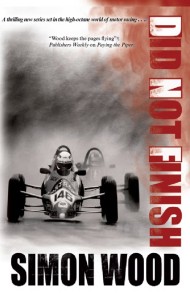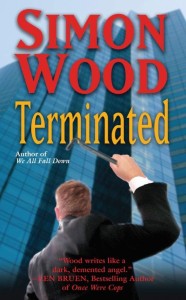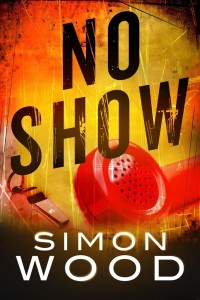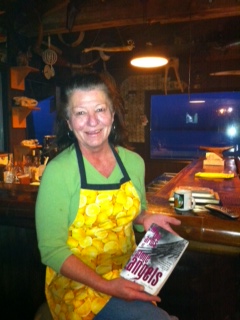Category Archives: Simon Wood
The Care & Feeding of Authors
Truth and Consequences
by Simon Wood
I put myself in a tricky position with my latest book, DID NOT FINISH. With most of my books, it’s inspired by something that happened in the real life. But whereas there’s usually a little distance between myself and incident, this time there wasn’t. I was there at the time of the incident.
most of my books, it’s inspired by something that happened in the real life. But whereas there’s usually a little distance between myself and incident, this time there wasn’t. I was there at the time of the incident.
In the 90’s, I was a competitive racecar driver. At the end of my third season, one of the drivers threatened to kill another driver unless he let him winning the championship deciding race. Word of this threat spread through the paddock like wildfire. No one took the threat seriously. It was just talk. That went out of the window when those two driver touched wheels during the race and the threatened driver died. Some odd things happened in the aftermath of the crash, such as edited TV coverage and a seemingly nonexistent police investigation. It was all very puzzling to a number of us who’d heard and seen things.
I’d always said I would write about the incident, but writing the book proved much harder than I’d ever expected. The problem was that I was too close to the source material. When I wrote about viatical settlements for ACCIDENTS WAITING TO HAPPEN and a series of suicides for WE ALL FALL DOWN, I spun a story around some very bare facts to construct a book that had very little in common with the facts. The problem with the early drafts of DNF was that it was autobiographical which made the novel very dull as it was way too personal and to be frank, not that entertaining. My problems were compounded by my thinly veiled attempts to hide the identities of actual people. I had hoped that in the 20 years since the actual incident went down that many of the characters were still very much involved with the sport. Then there was the victim and his family to consider. I’m sure they wouldn’t appreciate me raking up old memories. At the end of the day, as much I think I know what happened, I only had my perspective on events and not a complete picture and to make any insinuation was reckless. The upshot was the book ground to a halt
that many of the characters were still very much involved with the sport. Then there was the victim and his family to consider. I’m sure they wouldn’t appreciate me raking up old memories. At the end of the day, as much I think I know what happened, I only had my perspective on events and not a complete picture and to make any insinuation was reckless. The upshot was the book ground to a halt
After a long chat with my wife, we got to the heart of the matter—stop trying to rewrite history and write a novel. I had to do what I always do when I use something real to write a work a fiction. Incorporate the essence and leave the rest. Once I unshackled myself of any responsibility to tell the truth, the book became easier to write. I developed characters with some real depth and history. The plot went off in a direction that real life never went. And all in all, I have a book I’m very proud of.
The tough thing about writing, even with fiction, is that it’s a role that comes with responsibilities. You can’t just say anything and say it’s okay because it’s made up. Words are as powerful as bullets and you need to be careful where you aim before firing. And that’s the truth.
Simon Wood is an ex-racecar driver, a licensed pilot and an occasional private investigator. Simon has had over 150 stories and articles published. His short fiction has appeared in a variety of magazines and anthologies, and has garnered him an Anthony Award and a CWA Dagger Award nomination, as well as several readers’ choice awards. He’s a frequent contributor to Writer’s Digest. He’s the author of WORKING STIFFS, ACCIDENTS WAITING TO HAPPEN, PAYING THE PIPER, WE ALL FALL DOWN, TERMINATED and ASKING FOR TROUBLE. As Simon Janus, he’s the author of THE SCRUBS and ROAD RASH. His latest book is DID NOT FINISH.
The Anarchist in Me
by Simon Wood
Today TKZ is delighted to welcome fellow thriller writer and anarchist Simon Wood. I toured with Simon back when Boneyard was released, and in spite of that we remain friends. I highly recommend signing up for his newsletter, it’s easily one of the most entertaining out there…
I saw my author-friend, Tony Broadbent, not too long ago. We hail from the same hometown back in the old country. We got to chatting and he gave me a pat on the head and told me, “You’re like the Gary Oldman of the mystery world.”
Gary Oldman is one of my favorite actors, but I wasn’t sure of the correlation and asked, “Is that a good thing?”
“Yes,” he exclaimed. “There’s a lot of anarchy in your writing.” How subversive, I thought. I’m a rebel without an agenda. Mother will be delighted.
How subversive, I thought. I’m a rebel without an agenda. Mother will be delighted.
Well, the little exchange got me thinking about my writing. I don’t think people hit the keyboards with an agenda or a theme tucked under their arm—or if they do, it sort of sticks out. Agendas and themes develop on a subconscious level. Well, they do for me. I don’t go out of my way to put a slant on my stories. I just try to entertain, but inadvertently, I show a little leg now and again. So, I looked for the anarchy. And I think I saw it in the shape of conflict.
Stories require conflict. It’s a driving force that characters and stories thrive on, especially in mysteries and thrillers. The nature of the genre means there are going to be casualties and collateral damage. So, I like to inject my stories with a lot of conflict. The problem is that I’m quite a literal person and I think about things in very pure terms. Blame my engineering backgroun d. When I think conflict, I think about it in its most basic of meanings—total annihilation. Everything my lead character holds dear is under attack. I create this person so that I can destroy them. I place them and their world in an ivory tower, then go about stacking as much C4 explosive around the foundation as possible to blast it all apart. It only seems fair, doesn’t it? Conflict by its nature is salt to a wound. Character assassination is key for me. Only by putting everything in a protagonist’s world at extreme risk can the character grow. There can’t be a comfort zone or a safe haven for this person. Wouldn’t you want to read about a character in a situation like that?
d. When I think conflict, I think about it in its most basic of meanings—total annihilation. Everything my lead character holds dear is under attack. I create this person so that I can destroy them. I place them and their world in an ivory tower, then go about stacking as much C4 explosive around the foundation as possible to blast it all apart. It only seems fair, doesn’t it? Conflict by its nature is salt to a wound. Character assassination is key for me. Only by putting everything in a protagonist’s world at extreme risk can the character grow. There can’t be a comfort zone or a safe haven for this person. Wouldn’t you want to read about a character in a situation like that?
I flicked through some of my stories to see what I did to my characters and the annihilation is always there. Characters are put through the wringer and their lives will never be the same. This theme continues in my latest book, Terminated. I’ve really gone to town on the story’s protagonist, Gwen Farris. Her reputation is destroyed, her home life obliterated and she’s framed for crimes she didn’t commit. Everything she holds dear is in shambles, but if she’s to fight back, she has to develop into someone she’s never been before. Her life will never be the same and there will have to be a lot of rebuilding by the end, but she’ll be a stronger and more courageous person for it.
So I guess I do have anarchistic bent. Sorry. It wasn’t intentional. It’s just the way I tell ‘em.
Yours destructively,
Simon Wood
Simon Wood is an ex-racecar driver, a licensed pilot and an occasional private investigator. He shares his world with his American wife, Julie. A longhaired dachshund and five cats dominate their lives. He’s had over 150 stories and articles published. His short fiction has appeared in a variety of magazines anthologies, such as Seattle Noir, Thriller 2 and Woman’s World. He’s a frequent contributor to Writer’s Digest. He’s the Anthony Award winning author of Working Stiffs, Accidents Waiting to Happen, Paying the Piper and We All Fall Down. As Simon Janus, he’s the author of The Scrubs and Road Rash. His latest thriller, Terminated, is out in mass paperback. Curious people can learn more at www.simonwood.net .
WORK THOSE L’IL DOGGIES
by Simon Wood
Today TKZ is thrilled to welcome Simon Wood, a darn good writer who I was fortunate enough to tour with last summer (I can still recite his “one time I literally ran into an assassin” story by heart). He shares a unique take on what we’ve been discussing quite a bit lately, creative ways for authors to earn a living in the digital age.
The writing world is an odd industry, but no different from any other. I think writers sometimes forget that our stories are commodities. A writer’s body of work doesn’t lose its value. Therefore, stories should be worked for all they’re worth.
I didn’t look at my work this way until I heard science fiction and fantasy legend Gene Wolfe speak at a convention a few years ago where he was the guest of honor. He was talking about how he’s always made his stories work for him. A good story doesn’t have to end its life at its first printing. Like Halley’s Comet, it can keep coming back again and again for the enjoyment of a new audience. He’d calculated how much some of his stories had earned for him. A number of his stories had earned several dollars per word. Admittedly, it had taken a couple of decades to do that. Nevertheless, that was pretty amazing.
This was quite a revelation to me. I took to heart what Gene had said. I’d had a handful of stories published so far, most earning a couple of cents per word on average. I looked at my body of work and found ways of getting my stories published and re-published. Stories I sold to print markets I resold to webzines. I looked to foreign language markets where the story would be fresh. Within a couple of years, I’d resold some of my stories three times over.
While I still have a couple of stories reprinted every year, with print markets shrinking and most other markets looking for unpublished fiction, I turned to the internet. A few years ago, I discovered Fictionwise.com. They were only interested in previously published fiction. They operate on a similar platform as iTunes where users downloaded stories like people do with songs. It’s worked out very nicely. My stories are still available and their popularity is determined by the readers.
I’m now taking this approach with my books that are going out of print. I like to think there’s a demand for these books. Maybe not enough for a re-issue, but there’s certainly more than enough for e-publishing. The likes of Amazon’s Kindle and Smashwords.com have made it easy for me to keep my books out there and meet a demand. I’ve recently e-published DRAGGED INTO DARKNESS and WORKING STIFFS, two books of mine that I believe contain good work.
This is where a little discretion comes in too. I’m only republishing things that people ask about or that I can hand-on-heart say represent my best writing. There’s no point in me putting out things that are subpar. And I’ll be honest. There’s stories of mine that got published, especially in the early years, which I look upon as amateurish now and while I’m not ashamed of those stories I don’t feel they represent what I write now. I could be a total reprint slut and toss everything I’ve ever written at the eBook reader but it’s not worth it. There’s a massive pinball effect with a writer’s work. Someone reads a story and like it, so they check out something else I’ve written. That only works if what is out there is good. If it’s bad, it has the converse effect and they’re unlikely to seek out other works.
I view eBooks as another weapon in my publishing arsenal and not a threat to it. That’s why I’m also going to explore the e-publishing route for some stories that I’ve been sitting on that don’t fall into traditional print publishing options such as novellas and novelettes. There’s certainly an opportunity for me to experiment.
So how has working my stories hard fared for me? Not as well as it has for Gene Wolfe, but I’m getting there. Several of my stories have been picked up for different anthologies and have earned me two and three times what I was originally paid for the piece. One story, TRAFFIC SCHOOL, was published three times, each time earning pro-rates, before I put it on Fictionwise and there, it has found a following. It’s by far my bestselling story by a factor of at least two to one. I think this creepy little short about bad driving habits will be my little goldmine. My work for Writer’s Digest has done well too. A couple of the pieces have been reused two and three times and have earned four-digit paydays. I’ve now placed them on Smashwords.com and I’ll see how they work out there.
At the end of the day, as long as there are readers, stories are commodities that don’t diminish with age or time and the electronic option is helping there. And that’s all good as far as I’m concerned.
Learn more about Simon at www.simonwood.net and his work at:
Kindle Store
Smashwords.com
Fictionwise.com




